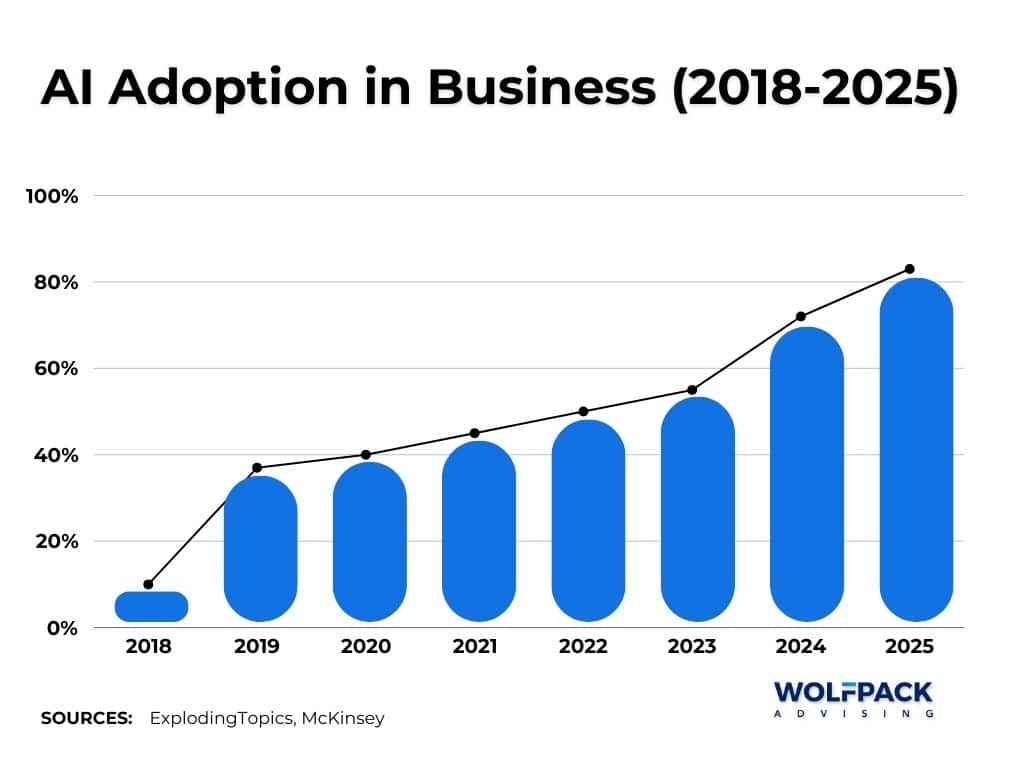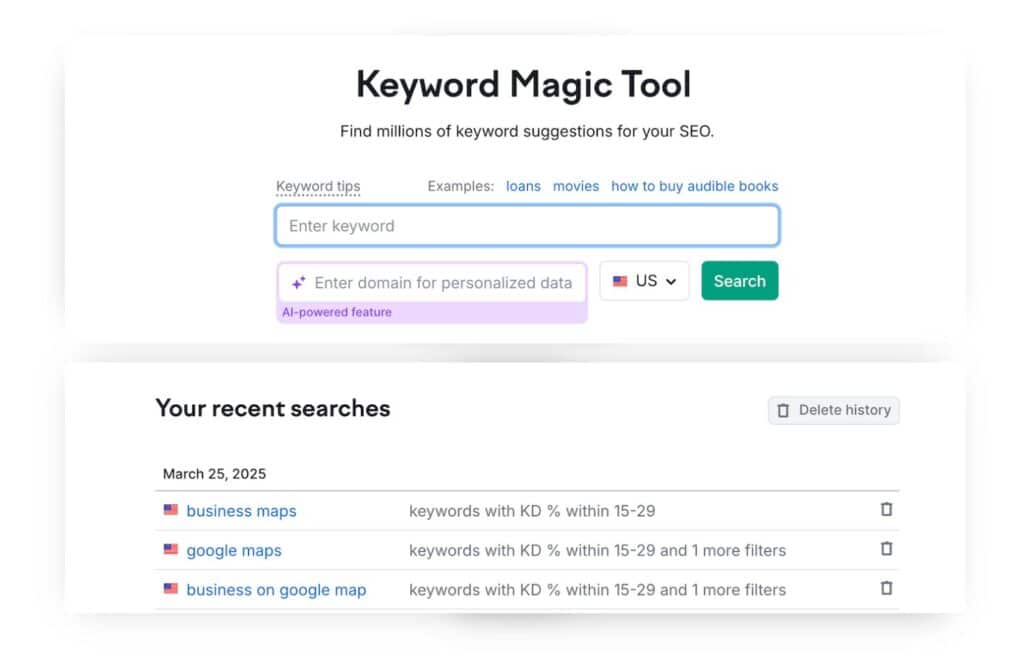Last updated on December 19th, 2025 at 11:40 am
The internet is full of “best AI tools for SEO” lists, but let’s be honest…most of them feel like fluff or ads. If you’re a business owner, marketer, or part of a lean team, you don’t have time to test every tool out there. You want to know which tools help you work faster, rank better, and get more traffic. You don’t want to waste hours or money.
This post shares a few AI tools for SEO and your digital strategy that are worth using. This is especially helpful if you manage your online presence in-house and have limited resources.
Contents
Table of Contents
The Real Benefit of Using AI Tools for SEO
You don’t need AI tools for SEO, but the right one can help you save time on repetitive research. It can help you find content ideas that match your customer’s needs. You can catch problems faster, like missing meta descriptions or duplicate headers. It also helps you write and repurpose content more quickly and easily.
This year, more than 80% of marketers reported using AI in their daily roles, with 51% utilizing AI tools specifically to optimize content for email campaigns and search engine optimization (SEO).

It’s important to remember that most still depend on human strategy and editing for brand alignment and industry details.
So, if you’re wondering whether these tools are helpful, the answer is yes, some of them definitely are. The most important part of an effective AI model, though, is still how we train them to meet our needs. Let’s explore the best examples and the ones that seem to learn the fastest.
Smart Ways Businesses Are Using AI in SEO Today
The best AI tools for SEO take things off your plate, not add to it with confusing or low-quality output that wastes time. Here are the most common, realistic ways that average businesses are using AI to take their time back:
- Writing blog post outlines in minutes instead of hours
- Finding better keywords that match what customers actually search
- Spotting what’s missing from a page (so you don’t fall behind competitors)
- Quickly improving older posts that aren’t ranking well anymore
- Getting writing help for things like meta descriptions, product blurbs, or FAQs
For example, if you have an old blog post that used to bring in traffic but doesn’t anymore (or you know it has outdated information in the content but it’s still bringing in traffic), tools like Surfer SEO or ContentShake can compare your content to what’s now ranking and tell you what needs fixing. Then, you don’t have to do the entire process manually, or worse, guess.

Or let’s say you’ve got a local service page that’s stuck on page two. A tool like Surfer SEO can scan top results, compare them to your page, and suggest simple content tweaks.
Now you’re using data from your AI assistant to update content that’s already almost there.
AI Tools for SEO Worth Adding to Your Workflow
The tools below are the ones we think are most helpful right now. We’ve grouped them by what they help you get done, so you can quickly find what fits your goals.
1. To Plan and Write Better Content
Gives you a fast, research-backed outline based on what’s already ranking on Google. Helpful if you’re not sure what to include in a blog post or service page.
This one works while you write. It shows you what to add—like keywords, subheadings, and word count—based on top-ranking pages. Very helpful for teams that write a lot of content.
ContentShake by SemRush
A great choice if you don’t know where to start (SemRush has a ton of other tools our team uses religiously, too). It suggests blog topics, outlines, and even first drafts based on your niche or location.
2. To Find the Right Keywords Faster
This tool finds keywords that are easier to rank for (based on what’s already out there). Great for small businesses trying to show up for niche or local searches.
Ahrefs Webmaster Tools (Free)
Shows you which pages are performing well, what keywords you rank for, and where your content is falling short. Pairs well with AI tools that help you act on that info.
Semrush Keyword Magic Tool
This tool gives you tons of keyword ideas sorted by topic and intent—start with a word and check out related search phrases, then sort by questions, search volume, and more. It’s especially useful for building out blog clusters or finding supporting keywords for a service page.

3. To Polish or Repurpose What You’ve Got
It’s helpful for rewriting sections of copy, summarizing a blog post, or coming up with FAQs. Just be sure to guide it with a very clear, detailed prompt and clean it up after. You can find prompt libraries or templates online that are good starting points for your tasks, then just tweak the prompts to make sure they’re perfect for the results you want.
Jasper AI
Faster than writing from scratch. Use it for product descriptions, blog intros, or meta text. Still needs editing and brand alignment, but it saves time.
4. To Spot and Fix SEO Problems
Alli AI
Great if your site has small technical issues (like broken links or slow-loading pages). It suggests fixes—and in many cases, can help you apply them too.
An affordable tool that checks how your content stacks up against what’s ranking now, and tells you how to improve it.
What to Watch Out For
Some tools will slow you down more than they help. Just because a tool is powered by AI doesn’t mean it’s helpful. Watch out for:
- 100% auto-generated content – Most of Google’s updates since March last year focus on helpful content made for people. Pages filled with AI text that lacks expertise, clarity, or originality will drop.
- Overhyped “all-in-one” platforms – Tools that claim to handle everything rarely do anything well.
- Impressive scoring systems that don’t matter – Your content doesn’t need a “100/100” from any AI model. It should solve the reader’s problem or offer original value.
- Complex dashboards – If you’re constantly Googling how to use it, it’s probably not worth your time (or saving you any).
Value the tools that do one thing really well and save your team time or stress. That’s the sweet spot.
Tool Takeaways by Pain Point
Most tools sound impressive at first—until you realize they don’t solve your actual problems. So instead of jumping into a free trial without a plan, start by asking yourself a few questions.
- What SEO task is slowing us down the most right now? (Writing? Planning? Auditing?)
- Are we already paying for a platform like Semrush or Ahrefs that offers more than we’re using?
- Do we need direction? Or streamlined execution?
- Who on the team will actually use it—and how often?
From there, try these first…
- ContentShake or Surfer SEO if you’re stuck figuring out what to write and how to structure it.
- LowFruits or Semrush Keyword Magic Tool if you’re stuck trying to find keyword angles that haven’t been overdone.
- NeuronWriter or ChatGPT if your team already writes but needs to tighten or improve older content, too.
- Ahrefs Webmaster Tools or Alli AI if you’re in cleanup mode and need fast visibility into technical fixes.
And here’s something we don’t hear often enough: you don’t always need new AI tools for SEO. Sometimes, it’s about getting better at using the ones you already have. Pick one goal, test before you commit, and don’t be afraid to move in a different direction if it doesn’t get the job done.
Conclusion
There’s such thing as no one-size-fits-all AI tools for SEO. But a few well-chosen ones can take real pressure off your team with patience and strategy.
If you’re tired of using too many tools or want to see what works, let Wolfpack help. We blend the best of human strategy with smart automation to get results that count.






